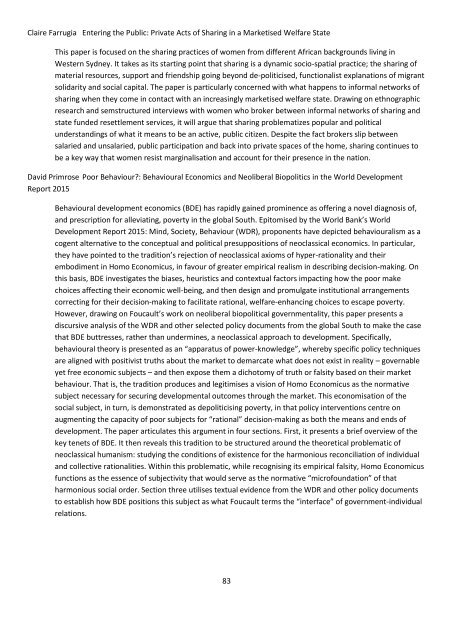Crossroads in Cultural Studies Conference 14-17th December 2016 Program Index
Crossroads-2016-final-draft-program-30-Nov
Crossroads-2016-final-draft-program-30-Nov
You also want an ePaper? Increase the reach of your titles
YUMPU automatically turns print PDFs into web optimized ePapers that Google loves.
Claire Farrugia Enter<strong>in</strong>g the Public: Private Acts of Shar<strong>in</strong>g <strong>in</strong> a Marketised Welfare State<br />
This paper is focused on the shar<strong>in</strong>g practices of women from different African backgrounds liv<strong>in</strong>g <strong>in</strong><br />
Western Sydney. It takes as its start<strong>in</strong>g po<strong>in</strong>t that shar<strong>in</strong>g is a dynamic socio-spatial practice; the shar<strong>in</strong>g of<br />
material resources, support and friendship go<strong>in</strong>g beyond de-politicised, functionalist explanations of migrant<br />
solidarity and social capital. The paper is particularly concerned with what happens to <strong>in</strong>formal networks of<br />
shar<strong>in</strong>g when they come <strong>in</strong> contact with an <strong>in</strong>creas<strong>in</strong>gly marketised welfare state. Draw<strong>in</strong>g on ethnographic<br />
research and semstructured <strong>in</strong>terviews with women who broker between <strong>in</strong>formal networks of shar<strong>in</strong>g and<br />
state funded resettlement services, it will argue that shar<strong>in</strong>g problematizes popular and political<br />
understand<strong>in</strong>gs of what it means to be an active, public citizen. Despite the fact brokers slip between<br />
salaried and unsalaried, public participation and back <strong>in</strong>to private spaces of the home, shar<strong>in</strong>g cont<strong>in</strong>ues to<br />
be a key way that women resist marg<strong>in</strong>alisation and account for their presence <strong>in</strong> the nation.<br />
David Primrose Poor Behaviour?: Behavioural Economics and Neoliberal Biopolitics <strong>in</strong> the World Development<br />
Report 2015<br />
Behavioural development economics (BDE) has rapidly ga<strong>in</strong>ed prom<strong>in</strong>ence as offer<strong>in</strong>g a novel diagnosis of,<br />
and prescription for alleviat<strong>in</strong>g, poverty <strong>in</strong> the global South. Epitomised by the World Bank’s World<br />
Development Report 2015: M<strong>in</strong>d, Society, Behaviour (WDR), proponents have depicted behaviouralism as a<br />
cogent alternative to the conceptual and political presuppositions of neoclassical economics. In particular,<br />
they have po<strong>in</strong>ted to the tradition’s rejection of neoclassical axioms of hyper-rationality and their<br />
embodiment <strong>in</strong> Homo Economicus, <strong>in</strong> favour of greater empirical realism <strong>in</strong> describ<strong>in</strong>g decision-mak<strong>in</strong>g. On<br />
this basis, BDE <strong>in</strong>vestigates the biases, heuristics and contextual factors impact<strong>in</strong>g how the poor make<br />
choices affect<strong>in</strong>g their economic well-be<strong>in</strong>g, and then design and promulgate <strong>in</strong>stitutional arrangements<br />
correct<strong>in</strong>g for their decision-mak<strong>in</strong>g to facilitate rational, welfare-enhanc<strong>in</strong>g choices to escape poverty.<br />
However, draw<strong>in</strong>g on Foucault’s work on neoliberal biopolitical governmentality, this paper presents a<br />
discursive analysis of the WDR and other selected policy documents from the global South to make the case<br />
that BDE buttresses, rather than underm<strong>in</strong>es, a neoclassical approach to development. Specifically,<br />
behavioural theory is presented as an “apparatus of power-knowledge”, whereby specific policy techniques<br />
are aligned with positivist truths about the market to demarcate what does not exist <strong>in</strong> reality – governable<br />
yet free economic subjects – and then expose them a dichotomy of truth or falsity based on their market<br />
behaviour. That is, the tradition produces and legitimises a vision of Homo Economicus as the normative<br />
subject necessary for secur<strong>in</strong>g developmental outcomes through the market. This economisation of the<br />
social subject, <strong>in</strong> turn, is demonstrated as depoliticis<strong>in</strong>g poverty, <strong>in</strong> that policy <strong>in</strong>terventions centre on<br />
augment<strong>in</strong>g the capacity of poor subjects for “rational” decision-mak<strong>in</strong>g as both the means and ends of<br />
development. The paper articulates this argument <strong>in</strong> four sections. First, it presents a brief overview of the<br />
key tenets of BDE. It then reveals this tradition to be structured around the theoretical problematic of<br />
neoclassical humanism: study<strong>in</strong>g the conditions of existence for the harmonious reconciliation of <strong>in</strong>dividual<br />
and collective rationalities. With<strong>in</strong> this problematic, while recognis<strong>in</strong>g its empirical falsity, Homo Economicus<br />
functions as the essence of subjectivity that would serve as the normative “microfoundation” of that<br />
harmonious social order. Section three utilises textual evidence from the WDR and other policy documents<br />
to establish how BDE positions this subject as what Foucault terms the “<strong>in</strong>terface” of government-<strong>in</strong>dividual<br />
relations.<br />
83


